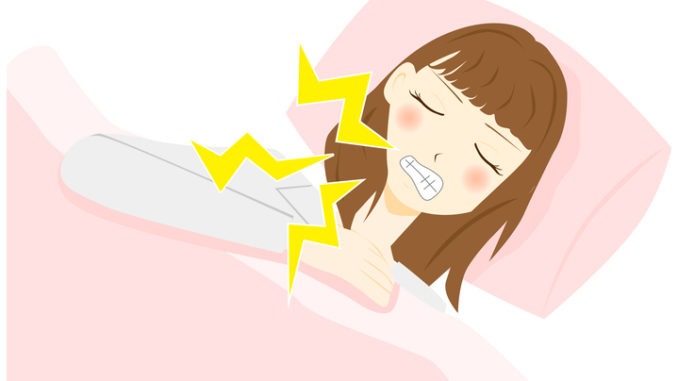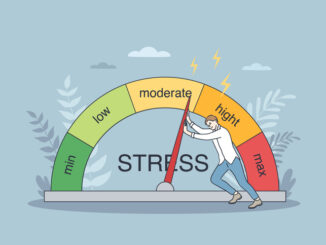
The pain of teeth-grinding is something many people struggle with, and yet lots of us don’t even realise we’re doing it – though we certainly feel it. Here, Rachel Sigee gets to the root of ‘bruxism’ – and how to stop it leaving you ground down
CREDIT: This is an edited version of an article that originally appeared on Happiful
It was recently reported that one-in-10 people in the UK grind their teeth, while other research suggests it’s between 15–20%. The true figure is likely to be higher since studies rely on self-reporting, and often people will not be aware that they grind their teeth until a dentist or a partner tells them.
The daily grind
Some dentists believe that teeth-grinding – or ‘bruxism’ – helps generate saliva and fight tooth decay; it could also be due to existing dental issues, or a sleep disorder. One recent study suggested it might actually be part of cognitive function – a sign that we are literally chewing things over.
Ultimately, experts don’t know exactly why we do it, but they tend to agree on one thing; it is often caused, and exacerbated, by stress. “I have teenagers complaining of jaw pain because they’ve got an exam coming up, or it could be adults going through a difficult time, a divorce,” explains Dr Ahmed Hussain, an associate dentist at Harrow-on-the-Hill Dental and Implant Practice while psychotherapist Natasha Crowe compares it to other, more familiar, physical manifestations of mental health issues such as tension headaches and IBS. “The body gives us signals that we’re under stress, but we tend to ignore them.”
Open wide
In Olive’s case her teeth-grinding had gone undetected for some time. “I had no idea I was doing it until my dentist told me that my back teeth were cracking with hairline fractures,” she says. Dr Ahmed agrees that cases where tooth breakage suddenly appears are not uncommon. “You look at someone’s teeth, and they don’t have any fillings, so it’s nothing to do with what they’re eating or their oral hygiene.” Sometimes the grinding is so bad that he can tell before he even examines them closely. “The edge of their teeth is dead straight, and that’s not natural to see.”
Good teeth are often a sign that we are taking care of ourselves, and it can be distressing to face unexpected dental work. The dream where all your teeth fall out is much scarier when the very act of going to sleep makes the nightmare a potential reality.
Ground down
Dr Ahmed treats around two patients a week for bruxism, and often this is accompanied by chronic headaches, insomnia, and jaw pain. He recalls a patient who “when her jaw locked, went into panic mode and couldn’t unlock it”. There are also those who clench their jaws during the day which Dr Simon Stern, a specialist periodontist and implant dentist at The Perio Centre on Harley Street, calls ‘awake bruxism’. “It doesn’t need to just be the dynamic movement,” he says. “It can be static – sitting there, clenching the muscles in your head.” In these cases jaw and breathing exercises, warm compresses and anti-inflammatory medication can help to reduce pain and tension.
But what about when we’re asleep?
On guard
“When it’s a subconscious thing at night time it’s almost like you’ve got no control over it,” says Natasha Crowe. This is where the most common treatment for teeth-grinding comes in – the dreaded mouthguard. Bruxism sufferer Jade admits, “I would wake up to find I’d spat it out or thrown it across the room. With my guard in, I initially found it hard to fall asleep, and felt nauseous – and it’s hardly romantic, although the lesser of two evils when the alternative is keeping a partner awake with grinding, which can affect intimacy.
“Unfortunately, there is no magic solution to getting used to it, although a custom-made mouthguard is likely to be more comfortable. I persevered.” Dr Stern insists, it’s worth it. “The guard can work, not just to protect the teeth, but actually to reduce or eliminate the bruxism.”
Break the habit
“Bruxism isn’t necessarily there for life,” says Dr Stern. “It can come and go.” This was the experience for Jo. “I haven’t experienced the symptoms for a while,” she says. “My body tends to cycle through different physical symptoms when I’m stressed and, at the moment, I’m not in a jaw-clenching phase.” This is why it’s important to tackle teeth-grinding from more than one angle – a mouthguard to minimise damage, but also, addressing contributing factors.
Natasha Crowe says that grinding our teeth is part of the pattern of how stress and anxiety lead to tension in the body. “The body can’t relax and feel tension at the same time,” she explains. “One client said to me, ‘It’s like I take a breath in the morning and I don’t let it out until I get home,’ and it’s so true.”
The manifestations of this tension can easily compound stress or anxiety. It becomes a vicious cycle, and finding a balance can be tricky. Charlie suffers from generalised anxiety disorder and discovered that anti-anxiety medication made her bruxism worse. “I started to get a really stiff, sore jaw, and noticed a clicking sound when I opened and closed my mouth. Now, I have regular acupuncture to treat both the pain in my jaw, and also the underlying anxiety, which I have found really helpful.”
As Charlie discovered, while teeth-grinding treatment is focused on protecting and saving the teeth, prevention is much more holistic. Dr Ahmed talks to his patients about reducing stress. “Things like relaxing music, exercising, and mindfulness. Sometimes we refer patients to a psychiatrist or a GP regarding CBT.” The most important thing is to acknowledge it, says Natasha. “Once you become aware of it, you have the ability to take control and have the power over it.”



Be the first to comment